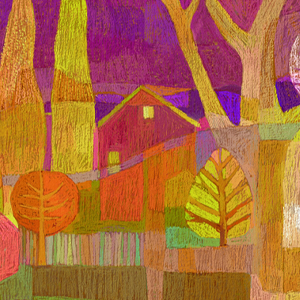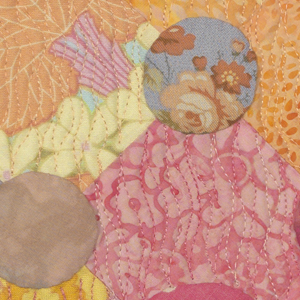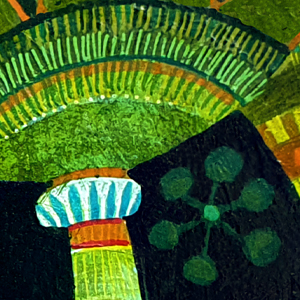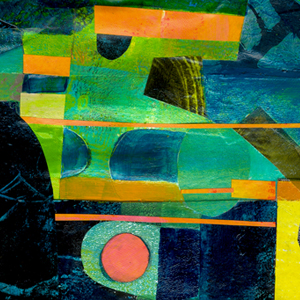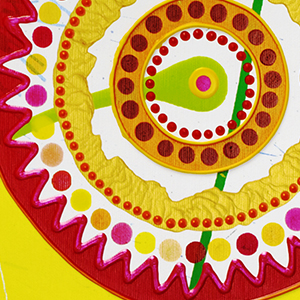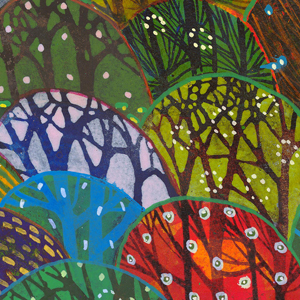
Good Education
A Framework for Civil Discourse Found in the Lines of a Prayer
Cristy Guleserian
Artwork: “Fractured Land #4” by Alejandro Rubio © 2018
Recently, while rummaging through a box of memorabilia from my youth, I found a high school paper I’d written on a Prayer of St. Francis. As I cringed through this adolescent relic of my emerging identity, I grew curious; though I consider myself spiritual, I wasn’t raised within any particular faith. I don’t recall studying this prayer in class, nor do I know how it became my topic.
Maybe my younger self sought a deeper connection to something beyond myself, or maybe it was a last-minute assignment I spun into something that sounded thoughtful. Either way, this paper has survived countless moves, closet purges, and intimate weekends with my shredder. Its endurance suggests I’ve placed some hidden value on the topic, worthy of reflection and exploration.
Revisiting this prayer through a more mature lens, I saw it as an anthem for what we need more of on our college campuses and in the world. It embodies the values I aspire to bring to others, a way of responding to life that is openhearted, altruistic, and oriented toward the greater good. The prayer encourages empathy, civility, and understanding, urging us to respond with kindness, compassion, and love. It could be a guide for creating learning communities that embrace pluralism, provide space for students to explore their values through civil dialogue, and foster a culture of understanding, inclusivity, and belonging.
Our society today mirrored in the microcosms of our campuses, has shifted away from considering the needs of others, focusing instead on defending our own perspectives, wants, and desires. Standing firm in our beliefs can be a strength, but when taken to extremes, it risks stalling conversation, collaboration, and relationships. When convictions are coupled with defensiveness and closed-mindedness, they deepen divides and can provoke aggressive reactions toward others’ perspectives and humanity. Civic virtues like civility, openness, humility, and grace are often overshadowed, dismissed as “old-fashioned,” or even criticized as tools of privilege, but in a pluralistic society, these virtues must accompany our convictions if we hope to pursue the common good.
How can we hold strong convictions and practice genuine civility and civic grace? As educators, are we modeling and encouraging humility and openness to ideas, or are we fostering generations more inclined to seek being understood than to understand?
I believe we can stand firm in our beliefs while committing to the common good and practicing civility. In fact, I find reassurance in the message of St. Francis.
Lord, make me a channel of thy peace,
that where there is hatred, I may bring love;
that where there is wrong, I may bring the spirit of forgiveness;
that where there is discord, I may bring harmony;
that where there is error, I may bring truth;
that where there is doubt, I may bring faith;
that where there is despair, I may bring hope;
that where there are shadows, I may bring light;
that where there is sadness, I may bring joy.
Lord, grant that I may seek rather to comfort, than to be comforted;
to understand than to be understood; to love than to be loved.
For it is by self-forgetting that one finds.
It is by forgiving that one is forgiven.
It is by dying that one awakens to Eternal Life.
His words, grounded in empathy and understanding, offer a simple yet profound framework for civil discourse that emphasizes personal responsibility, engages humility, embraces pluralism, and respects the humanity of others—a model we can apply even from a secular perspective. Our society deeply needs this, and each of us can consider our personal responsibility and influence within the university community to model civil discourse and foster the dispositions needed for it. This involves not only nurturing these qualities in students but also creating environments that make them possible, building a culture among faculty, staff, students, and administration that fosters open engagement with diverse perspectives, self-examination, and a deepening of identity for all.
Understanding Courage of Convictions
Navigating today’s ideologically diverse college environments requires students, and those of us responsible for their educational experience, to balance conviction with respect for others, expressing our beliefs in ways that do not harm or silence. Developing both courage of conviction and discernment is crucial as students define their values amidst new ideas, challenges, and opposition.
Colleges have a responsibility to foster environments that encourage this development. Faculty and staff need to model openness and create spaces where students feel safe sharing their perspectives. This begins with faculty and staff themselves embodying the qualities of trust, inclusion, and belonging, while institutions provide the structures and leadership that reinforce a culture supportive of character development, community, and freedom of expression.
Students, too, have a responsibility to articulate and defend their beliefs thoughtfully and humbly. Campus diversity in backgrounds and ideologies offers students valuable opportunities to refine their worldviews through interactions that challenge and expand their perspectives. With supportive relationships and spaces for reflection, students can learn to engage civilly, even amid disagreement, building the practical wisdom and resilience needed for genuine discourse.
In an era of rapid information and diverse ideologies, students are often overwhelmed by the need to defend their views, sometimes in response to pressures from social networks or movements. Developing reflective practices in conjunction with character dispositions allows students space to critically evaluate information, stay true to their values, and engage compassionately with differing perspectives. Such habits prepare students to carry these values beyond campus, equipping them to navigate societal tensions between conviction and pluralism with empathy and resilience.
It can be challenging to stand firm in one’s beliefs when they conflict with the broader campus community’s values or needs. This tension often appears in debates over free speech and activism. Increasingly, we’re also noticing this friction between individual wellness and community well-being. Amid a fast-paced campus climate, where rigorous demands often overshadow the call for self-care, students, faculty, and staff alike must navigate competing pressures: advocating for their convictions, striving for excellence in work and studies, maintaining personal well-being, and fostering a compassionate community. Courage is essential—not only in expressing one’s beliefs but also in setting healthy boundaries around work and balancing self-care with collective goals. While advocacy for causes such as social justice or work-life harmony is vital, the energy needed to sustain it can be draining. In moments of exhaustion, our ability to engage civilly may falter, creating discord instead of cohesion. By prioritizing compassion, reflection, and authentic relationships, we can foster a campus culture that supports enduring advocacy and encourages innovative, collaborative solutions to shared challenges, nurturing both individual and community resilience.
Fostering Communities of Care and Compassion
Care and compassion can be nurtured through intentional practices and authentic relationships that require individuals to take personal responsibility for creating a caring community. Both self-care and compassion for others are essential; practicing self-compassion can inspire similar expressions in our interactions. This foundation is crucial for bridging divergent ideas. Regular pauses for observation help us develop awareness of our own needs and those of others, allowing us to navigate emotions that might lead to aggressive reactions. Instead, we can engage strategies that help us to respond with curiosity, humility, and empathy. Practices like a 90 second pause at the beginning of meetings and classes can foster a habit of awareness, mindful breathing, or noticing and identifying emotions. When we notice feelings of overwhelm, we might prioritize basic needs such as resting, eating, or connecting with supportive friends or colleagues. Shifting one-on-one meetings from a virtual or office space to a walking meeting can foster both connection and well-being, while the movement supports creative thinking. The aim is to prepare ourselves to move beyond reactive emotions that hinder connection, and instead foster dialogue grounded in peace and understanding. Highlighting the interconnectedness of self-awareness, self-care, and care for others creates a nurturing environment where civil dialogue can thrive. These foundational practices prepare us to align with the message of St. Francis.
Make Me a Channel of Peace
Setting the intention to be a channel of peace embodies personal responsibility for modeling the culture we wish to foster. To promote peaceful spaces on college campuses, we must embody a disposition of peace ourselves. Simple daily practices—such as morning observation, mindful walks, or brief pauses at the start of meetings—can help clear our minds and cultivate a calm internal environment. When we cultivate inner peace, we are more likely to bring that serenity to our interactions with others. While it may feel unrealistic to create time for this practice amidst our busy lives, we each have some autonomy to influence our surroundings. Identify where that autonomy exists and begin to model and share a calm disposition with others. Leaders should leverage their positions to promote well-being through supportive communications or policies while ensuring their own actions align with these values. Inconsistencies between words and actions can diminish trust, so it’s vital to align our intentions with our behaviors. Observe how these subtle changes impact your relationships and approach to work and life. Though change may be gradual, consistent focus on these practices, combined with patience and acceptance, can lead to a cultural shift.Where There Is Hatred, I May Bring Love
This call reinforces the importance of personal responsibility in addressing feelings of hatred, anger, or resentment. Examine the roots of these emotions: Am I navigating this anger productively? A useful exercise is to identify a specific person or institution you feel negatively towards and reflect on the reasons for these feelings. Look for aspects of that person or system that don’t evoke strong negative emotions. With an individual, focus on common interests, or invite them to coffee and listen to their story. Get to know the landscape of their life outside of the tension. The goal is to shift your perspective from hatred to a more loving view, humanizing others in the process.Where There Is Wrong, I May Bring the Spirit of Forgiveness
Forgiveness is a powerful act of self-compassion that allows us to release anger and accept that we cannot change the past. Holding onto resentment harms us more than the wrongdoer. Forgiveness is a personal choice requiring time, intentionality, and sometimes support from friends or professionals. Recognize that forgiveness can also be inward; carrying our own guilt or shame can hinder our ability to forgive or connect with others. This process is reciprocal: forgiving others can lead to forgiving ourselves and vice versa.Where There Is Discord, I May Bring Harmony
Bringing harmony to discord requires a willingness to confront and understand the chaos. Explore the tensions between the current state and how things ought to be. Creative tension can generate the most productive ideas. Embrace discomfort and vulnerability to create spaces where experiences and beliefs are shared. Understanding and connection can reveal common ground while embracing differences, allowing the various parts of a community to interact harmoniously.Where There Is Error, I May Bring Truth
Begin with self-reflection: Am I creating false narratives about others? How do I know these stories are true? Are my beliefs and perspectives informed by evidence-based resources? Too often, we act on misinformation or partial truths, hindering progress. Conversations can dramatically change when grounded in accurate information. Recognizing our own biases and truth-seeking fosters understanding and allows for informed decision-making.Where There Is Doubt, I May Bring Faith
Faith can be understood in various ways, even secularly. We all have faith in certain aspects of life, whether it’s the reliability of technology or the predictability of paychecks. When doubt arises, shift your focus from what could go wrong to what could go right. Reflect on past experiences where doubt held you back. Embracing uncertainty can reveal strengths and connections previously unrecognized. Cultivating trust creates a foundation for vulnerability and exploration in relationships, opening pathways to creativity and understanding.Where There is Despair, I May Bring Hope
A negative perspective can cloud our view of the world, making it hard to see the potential for positive change. Hope is a vital fuel for growth and renewal. Always seek opportunities to bridge differences and foster understanding. Sometimes, creating hope means changing your environment or perspective. It requires intentional effort and a willingness to act. The reality might also be that some exist in systems or structures that are inherently designed for inequitable outcomes that are out of the control of an individual. If you know you have power within these systems, use it in a way that gives others an opportunity for hope. Providing hope for others does not need to mean despair for yourself.Where There Are Shadows, I May Bring Light
Consider what you might be missing. Whose perspectives do you need to engage with to understand differing viewpoints? Operating in darkness limits our understanding; we often jump to conclusions without recognizing what we don’t know. Seek clarity and be willing to explore unconscious biases, as these discoveries can pave the way for deeper connections.Where There Is Sadness, I May Bring Joy
When defeated, emotions like sadness can cloud our judgment. Joy can act as an antidote, but it’s crucial to navigate these feelings without suppression. Start by identifying your emotions, understanding their wisdom, and finding ways to transform discomfort into comfort. This process can illuminate your needs and help you approach situations as opportunities for learning and growth.Comfort Rather Than Be Comforted. Understand Rather Than Be Understood. Love Rather Than Be Loved.
This emphasizes selflessness in relationships. In moments of disagreement, we may feel uncomfortable, vying for our own needs rather than considering others. By extending understanding and compassion, we invite reciprocity. Seeking to love rather than be loved opens pathways for connection and civil discourse.Self-Forgetting Is Where One Finds
Letting go of selfishness enables us to contribute to a larger community while still recognizing our own needs. Suspending judgment creates space to listen to others, facilitating identification and collective progress. This does not require abandoning our convictions but rather embracing diverse perspectives and seeking collaborative solutions amid tensions. Empathy, reconciliation, and service can guide students in their experiences with peers and the campus community. By modeling these practices, we help them cultivate their personal convictions within a healthy civic environment. Creating a culture that values empathy and understanding over competition will foster positive change, enabling individuals and collectives to engage in meaningful dialogue and navigate uncertainty with civility and creativity. Together, we share the responsibility to foster a campus culture where everyone feels they belong and can be seen, heard, and valued. Cristy Guleserian is the Executive Director of Principled Innovation at Arizona State University, Mary Lou Fulton Teachers College. Cristy works collaboratively with faculty, staff, students, and community partners to integrate ASU’s 9th design aspiration, Practice Principled Innovation, into culture, curriculum, and practice.
Cristy Guleserian is the Executive Director of Principled Innovation at Arizona State University, Mary Lou Fulton Teachers College. Cristy works collaboratively with faculty, staff, students, and community partners to integrate ASU’s 9th design aspiration, Practice Principled Innovation, into culture, curriculum, and practice.
Spring 2025
Part I: Defining Virtue
James Arthur
Dayna L. Cunningham
Greg Lukianoff
Najeeba Syeed
Interlude: Defining Moments
Part II: Defining Vocation
MORE







